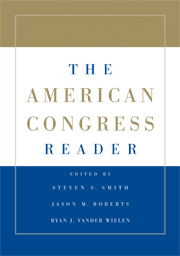Book contents
- Frontmatter
- Contents
- THE AMERICAN CONGRESS READER
- PART I THE AMERICAN CONGRESS: MODERN TRENDS
- PART II REPRESENTATION AND LAWMAKING IN CONGRESS: THE CONSTITUTIONAL AND HISTORICAL CONTEXT
- PART III CONGRESSIONAL ELECTIONS AND POLICY ALIGNMENTS
- 8 Elbridge Gerry's Salamander
- 9 Strategic Politicians and the Dynamics of U.S. House Elections, 1946–1986
- 10 Congress
- PART IV MEMBERS, GOALS, RESOURCES, AND STRATEGIES
- PART V PARTIES AND LEADERS
- PART VI THE STANDING COMMITTEES
- PART VII THE RULES OF THE LEGISLATIVE GAME
- PART VIII THE FLOOR AND VOTING
- PART IX CONGRESS AND THE PRESIDENT
- PART X CONGRESS AND THE COURTS
- PART XI CONGRESS, LOBBYISTS, AND INTEREST GROUPS
- PART XII CONGRESS AND BUDGET POLITICS
- PART XIII FURTHER READINGS ON CONGRESSIONAL POLITICS
9 - Strategic Politicians and the Dynamics of U.S. House Elections, 1946–1986
Published online by Cambridge University Press: 05 June 2012
- Frontmatter
- Contents
- THE AMERICAN CONGRESS READER
- PART I THE AMERICAN CONGRESS: MODERN TRENDS
- PART II REPRESENTATION AND LAWMAKING IN CONGRESS: THE CONSTITUTIONAL AND HISTORICAL CONTEXT
- PART III CONGRESSIONAL ELECTIONS AND POLICY ALIGNMENTS
- 8 Elbridge Gerry's Salamander
- 9 Strategic Politicians and the Dynamics of U.S. House Elections, 1946–1986
- 10 Congress
- PART IV MEMBERS, GOALS, RESOURCES, AND STRATEGIES
- PART V PARTIES AND LEADERS
- PART VI THE STANDING COMMITTEES
- PART VII THE RULES OF THE LEGISLATIVE GAME
- PART VIII THE FLOOR AND VOTING
- PART IX CONGRESS AND THE PRESIDENT
- PART X CONGRESS AND THE COURTS
- PART XI CONGRESS, LOBBYISTS, AND INTEREST GROUPS
- PART XII CONGRESS AND BUDGET POLITICS
- PART XIII FURTHER READINGS ON CONGRESSIONAL POLITICS
Summary
Jacobson considers the role of challengers and national conditions in U.S. House elections. He finds that national conditions, such as the economy, scandal, and so on have little direct effect on congressional elections. He argues that national conditions play out through the entry/exit decisions of incumbents and challengers. Incumbents tend to retire when national conditions run against their party, whereas high-quality challengers run when conditions favor their party.
Free, competitive elections are supposed to encourage leaders to govern responsibly because voters can fire them if they do not. But the kind of accountability elections enforce depends on the structure of electoral politics. Where votes are cast to choose a governing party – and only incidently particular legislators, as in most parliamentary systems – enforcement of collective responsibility is unproblematic, and incentives for legislators to pursue successful national policies are unambiguous. Contests that revolve around local candidates and issues to the neglect of national parties and programs, like most present-day House elections, reward individual responsiveness at the expense of collective responsibility. They inspire far more sensitivity to the local implications of policies attacking national problems than to the national problems created by aggressive pursuit of local interests. A national legislature composed of people who believe that when it comes to elections, “all politics is local” naturally finds it difficult to act responsibly.
For this reason, any feature of congressional election politics that does enforce some degree of collective accountability deserves special attention.
- Type
- Chapter
- Information
- The American Congress Reader , pp. 113 - 125Publisher: Cambridge University PressPrint publication year: 2008



